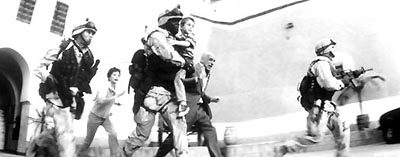| "A shot-at marine and a weak lawyer" | ||
| Rules of Engagement | ||
 |
||
| Review by Ross Anthony | ||
|
Deep in the thicket of the Vietnam War, anonymous bullets fly, ripping through branches, streams, leaves, catching flesh as the digital frame stutters bursting into red. This impressive, yet bloody sequence fixes the history of Tommy Lee and Samuel L. as battle-bonded mates. But it's a present day military action in Yemen that ties Samuel L. onto the hot seat and Tommy in the extremely warm one just beside him. An unruly crowd outside the US embassy prompts the passage of three choppers full of Sam and his men to "baby-sit" on foreign turf. But when the poop hits the fan, Sam risks life and limb to evacuate the ambassador and his family. At the end of the day the streets are bloodied with dead women and children and Sam stands alone at the end of the national security adviser's pointed finger. A military court-martial trial comprises the rest of the film. Samuel relies on old buddy Tommy Lee to defend him against one of the militaries finest prosecutors, Guy Pearce. Pierce is fierce, a bony Chihuahua with a New York accent (though he's surprisingly a British born Aussie). Tommy reluctantly takes on the case, and finding no strong leg to stand on, becomes disillusioned concerning his best bud's innocence. I love this development. We too, begin to doubt Jackson. But just as the tension mounts, bam, we (the audience) are presented with a two-minute scene that spills the beans concerning Sam's guilt/innocence. Why? No longer can we enjoy the delicately difficult position Tommy Lee must endure, because though he is not privy to our intelligence - somehow he seems to have resolved his internal conflict along with us. Still, Jones and Jackson are so rock hard, that it's impossible not to be compelled to the proceedings. Recognition is due also, to the excellent audio mixing. The sound on this film "Rules!" Unfortunately, the climax comes and goes with less impact than nearly every other scene proceeding. "Rules" picks up and turns around the "Few Good Men" story, putting Tommy Lee in the position of defending the Jack Nicholson argument. In the end, "Rules of Engagement," though shrapnel-ridden and faulted, still stands proud. (I ran into a couple of real live US Marines after the screening. FYI, They were pleased with the film's portrayal of the military.) |
||
 |
||
|
|
||
|
||
Grade..........................B+ |
||
Copyright © 2000. Ross Anthony, currently based in Los Angeles, has scripted and shot documentaries, music videos, and shorts in 35 countries across North America, Europe, Africa and Asia. For more reviews visit: RossAnthony.com |
||
|





